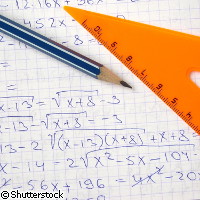Kids do the math, the easy way
If a student ever says mathematics isn't fun, tell them they're wrong. Thanks to the ingenuity of a team of EU-funded researchers, an integrated theoretical framework on the use of digital media has been developed, representing mathematical ideas and generating mathematical meaning. The REMATH ('Representing mathematics with digital media') project received over EUR 2.15 million under the 'Information society technologies' (IST) of the Sixth Framework Programme (FP6). The REMATH project partners, coordinated by the Research Academic Computer Technology Institute (RACTI) in Greece, said their new and innovative method will help students realise that maths isn't as difficult as they've always thought. Many schoolchildren have difficulty understanding the complex formulas of maths, especially calculus, algebra and geometry. Conventional methods leave students baffled: they teach students about how different maths equations work, but information is lacking about why they work or why they're important. The reality is that there are significant differences to what is being taught inside the classroom and what students encounter outside their schools. In particular, the advent of the Internet and development of computer games are proving that innovation is pivotal to teaching. 'Students are increasingly living in two worlds: the world of the classroom and the real world, and the two are growing farther apart,' explained Professor Chronis Kynigos from RACTI, who is also head of the Educational Technology Lab at the University of Athens. The REMATH project leader said that while the European educational community has not sat idly back and let the problem escalate, the efforts being made across Europe are diverse, disjointed and sporadic. 'The situation is very messy,' Professor Kynigos said. The REMATH project partners determined that order was needed to resolve this problem. The eight-strong consortium developed novel teaching aids, in the form of software tools known as 'Dynamic Digital Artefacts' (DDAs), as well as 13 context-sensitive 'Pedagogical Plans' for teachers to use within the guidelines of national education curricula. The team has already tested their tools in a number of European schools. 'The state-of-the-art tools and Pedagogical Plans cover a wide variety of mathematical fields,' Professor Kynigos pointed out. 'Some use traditional mathematical representations while others are more like interactive games that show the role maths plays in the real world,' he added. 'The tools are designed to make students think and help them learn how maths works in the real world in a way that is fun and engaging. The tools are not there to help them regurgitate a mathematical formula for a test.' The REMATH partners said they noted a dramatic effect in classrooms after the students were introduced to this interactive teaching system. Teachers, for their part, welcomed the innovative system, especially since they saw how beneficial it is to the students. 'Many students commented that they didn't even feel like they were in maths class at all,' the project leader said. The researchers said three spin-off companies are in the process of commercialising some of the project's tools. The LEIBNIZ Laboratory of Université Joseph Fourier in France, Istituto Tecnologie Didattiche (CNR-ITD) in Italy, and Greece's Educational Technology Lab of the University of Athens set up the spin-offs. Also contributing to this project are Université Paris 7 Denis Diderot, Equipe de Recherche en Didactique des Mathématiques (DIDIREM) in France, Università degli Studi di Siena in Italy, Talent SA in Greece and the Institute of Education - London Knowledge Lab at the University of London in the UK.
Countries
Greece, France, Italy, United Kingdom



